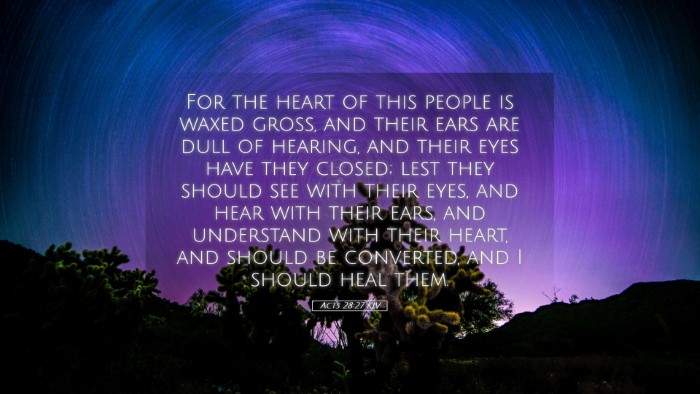Commentary on Acts 28:27
Verse Context: Acts 28:27 states, "For this people's heart is waxed gross, and their ears are dull of hearing, and their eyes have they closed; lest they should see with their eyes, and hear with their ears, and understand with their heart, and should be converted, and I should heal them." This verse encapsulates a theme of spiritual blindness and rejection of God's message, reflecting a critical juncture in the apostolic ministry and the broader narrative of the New Testament.
Exegesis and Theological Insights
The apostle Paul quotes Isaiah to articulate the spiritual condition of his audience, which serves both as a warning and a profound insight into human nature. The divine intent to heal and restore is met with a tragic response highlighted by the people's obstinacy. This situation calls for an in-depth analysis of the heart's condition, the role of divine revelation, and the theological implications of spiritual receptiveness.
1. Human Condition and Spiritual Receptiveness
Matthew Henry's Commentary: Henry observes that this passage indicates a grim reality—the heart can become calloused, dull, and resistant to the truth. He emphasizes the seriousness of failing to respond to divine revelation. Henry asserts that the Israelites' history illustrates how continued disobedience leads to a state where one becomes incapable of perceiving the truth.
Albert Barnes' Notes: Barnes elaborates on the phrase "waxed gross," interpreting it as a state of moral insensitivity. He underscores the relationship between hearing and understanding the truth of the Gospel. Barnes points out that spiritual blindness often stems from a willful choice to reject what is revealed, leading to judicious hardening from God, which reinforces the gravity of the consequences of ignoring divine messages.
2. The Role of Divine Revelation
Adam Clarke's Commentary: Clarke highlights the profound aspect of how God's revelation can be inadvertently spurned. He explains that in the face of overwhelming evidence of God's truth—through Christ’s ministry and the apostles—many remained unmoved. This is essential for scholars to understand the interplay between divine sovereignty and human agency.
Moreover, Clarke stresses that God's desire to heal is evident; yet, the refusal to engage with His truth results in spiritual blindness. The act of closing one's eyes and deafening one's ears illustrates a deliberate aversion to facing the truth of God. This commentary guides students and theologians into deeper reflection on the nature of spiritual sickness and the hope of divine healing through repentance and faith.
3. Implications for the Church Today
This verse’s implications extend beyond the historical context into contemporary Christianity. Many believers may find themselves in similar circumstances of indifference or blindness, leading to a destruction of faith and community vitality.
- Call to Awareness: Pastors and church leaders are reminded of the necessity to foster an environment conducive to spiritual growth and receptiveness. Frequent reminders of the need for personal spiritual vigilance in the face of a world that often promotes indifference are essential.
- Emphasis on Evangelism: This verse serves as a clarion call for evangelistic efforts, recognizing that the work of the church is to pierce through spiritual blindness with the light of Christ. Engaging with the community and addressing apathy towards the Gospel must be a priority.
- Prayer for Enlightenment: Recognizing human incapacity to comprehend spiritual truths alone, there is a need for fervent prayer that the Holy Spirit will open hearts and minds to God's message.
Conclusion
Acts 28:27 presents a sobering reflection on human nature's propensity to reject divine truth, yet it also offers a framework for understanding God's earnest desire to heal and restore. As we grapple with the indifference and rejection seen in the world, we are called to examine our own hearts and remain vigilant in proclaiming the transformative message of the Gospel. The insights from public domain commentaries provide a rich tapestry of understanding that can guide pastors, students, and theologians in navigating these profound spiritual realities.


